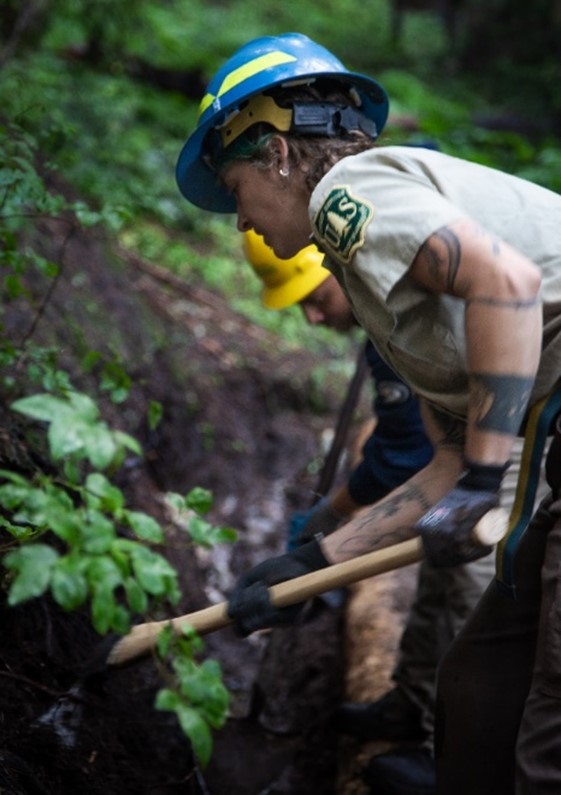Take action: Forest Service cuts to seasonal staffing will hurt trails and recreational access
A budget crisis at the U.S. Forest Service will reduce its ability to maintain trails, clean restrooms, collect trash and steward public lands. Learn what is happening and how you can help.
If you hike in Washington, odds are excellent that you’ve enjoyed trails on U.S. Forest Service land. About 23% of Washington is managed by the U.S. Forest Service. National forests contain some of the most iconic landscapes, popular campgrounds and beloved hiking trails in the state. Climb Mount St. Helens, hike through the Enchantments, visit Granite Mountain Fire Lookout, or backpack along Lake Chelan to Stehekin and you are enjoying some of the over 9,000 miles of national forests trails in Washington.
A funding crisis is putting Forest Service trails, campgrounds and other types of outdoor recreation at risk. The U.S. Forest Service is currently making major cuts to its workforce that will reduce its ability to maintain trails, clean trailhead restrooms, collect trash and provide essential services.

Forest Service staff pause while hiking back from visiting a trail maintenance worksite on the Okanogan Wenatchee National Forest. Photo by the U.S. Forest Service.
budget crisis will cut jobs and reduce services
National forests are managed by the federal government for a mix of purposes including recreation, timber production, and preserving natural resources and biodiversity. The Forest Service has historically accomplished most of its on-the-ground work with temporary employees who work for a portion of the year.
The Forest Service currently has less money than it needs to cover its expenses and pay its staff. The agency has a deficit of more than $700 million. In response, the chief of the Forest Service announced that the agency will not hire any seasonal positions except those that respond to forest fires. This means cutting more than 2,400 seasonal jobs, including trail crews, wilderness rangers, biologists, and many other types of temporary staff.
A U.S. Forest Service employee works alongside a Washington Conservation Corps member to maintain a trail in the Methow Valley Ranger District. Photo by U.S. Forest Service
blocked trails, unsanitary bathrooms and lack of backcountry support
It takes a lot of time and effort to maintain Forest Service trails. Volunteers, including the thousands of people who power WTA work parties, keep many national forest trails open. But volunteers are not the only ones in the woods fixing trails and clearing obstacles. Forest Service trail crews spend their summers in the backcountry. Each year, those seasonal employees accomplish about half of the trail maintenance completed on national forest trails.
When you hike on national forest lands next summer, you will feel the absence of Forest Service seasonal staff. You will likely see trails and even roads blocked by logs. You may notice small landslides and debris flows that bury your path or find trails covered in thick brush. At trailheads, you may find unsanitary bathrooms.
Here are some of the tasks that seasonal workers impacted by the cuts do for the Forest Service:
- Share information with the public about recreation and regulations.
- Maintain trails, cut brush, remove logs, build rock retaining walls
- Repair infrastructure including tables, signs, buildings and fire pits.
- Inspect trail bridges
- Patrol wilderness areas and protect natural resources from avoidable damage
- Conduct surveys of wildlife and collect other types of scientific data.
- Help control noxious weeds
- Assist in laying out timber sales and plant trees after a timber harvest.
- Maintain range structures like fencing
- Remove graffiti and pick up trash
Why is this happening?
This budget crisis has both long-term and short-term causes. Since the 1990s, the Forest Service has lost about 8,000 jobs nationally, including about half of its trail crew and forestry technician positions. Funding for the agency has not kept up with rising costs. WTA consistently advocates for the Forest Service to be better supported so that it can hire more people to complete its complex mission. Recent events have taken the agency in the wrong direction.
- In the last few years, costs at the Forest Service have gone up but federal funding hasn’t. For instance, in 2022 and 2023, federal workers received cost of living adjustments to lift real wages to match inflation. However, Congress did not pass bills to increase funding for salaries and expenses at the U.S. Forest Service to pay for those wage increases.
- The Forest Service added employees as the agency works to implement projects that reduce the risk of forest fires, using funds from the Infrastructure Investment and Jobs Act and the Inflation Reduction Act, but that funding was short term and is not available moving forward.
- The U.S. House of Representatives recently passed a spending bill that would cut funding for the Forest Service in 2025. This bill has not become law, but the Forest Service is making cuts to prepare for a possible reduction in resources.
The result of all of this is a depleted agency that is making drastic cuts to its operations and searching for ways to save money in all of its non-fire-fighting programs.
What is WTA doing?
Since the cuts were announced, WTA has advocated for the Forest Service to adjust their plans. WTA led 27 organizations in lobbying the agency to exempt seasonal positions that are funded entirely from outside grants from the cuts. Eliminating grant funded positions will provide little cost savings and disproportionately hurt trails. WTA is coordinating with nonprofit partners and talking with Forest Service leaders, Washington’s congressional delegation, the Office of Management and Budget and others to explore additional long-term solutions.
Public lands need robust funding. WTA will continue to work with partner organizations from across the country to advocate for trails and ensure that everyone can enjoy their benefits. In 2025, Congress has the opportunity to invest in our country's trails by reauthorizing the Great American Outdoors Act's Legacy Restoration Fund, which has directed more than $149 million to help reduce the maintenance backlog on national forest trails over the last 4 years. We will work to get that legislation passed. At the same time, we expect the new Congress and incoming presidential administration to consider cuts to government programs including further shrinking budgets at the U.S. Forest Service and Bureau of Land Management. WTA will remain a stalwart voice speaking up for public lands.
How can hikers help?
Congress has not yet passed bills to fund the government in 2025. There is still time to avoid the further budget cuts and address the Forest Service funding crisis. Washington’s congressional delegation needs to hear why national forest trails are important to you. Take action today.
In 2025, we need Congress to reject the Forest Service funding cuts proposed by the House of Representatives. This year and moving into the future, we need increased investment in the Forest Service to support staffing including seasonal employees.
Calling members of Congress is a powerful way to make your voice heard. Staff who work for elected officials keep track of the calls they receive and consider their constituents' views when they decide what challenges to prioritize. A single call can elevate an issue. All members of Congress benefit from hearing that hikers care about public lands and want the Forest Service and recreation to be well funded.
We’ve made it easy for you to call your members of Congress today. All it will take is a couple clicks and a few minutes of your time. We have a script you can use. After providing your zip code, you will get a phone call that automatically connect you to the right offices. Join other hikers in speaking up for trails.



Comments
mellow moods on Take action: Forest Service cuts to seasonal staffing will hurt trails and recreational access
Thank you for writing this article so clearly and sharing this issue with the public so we know and can better help the cause
Posted by:
mellow moods on Dec 03, 2024 11:53 PM